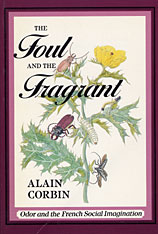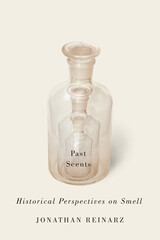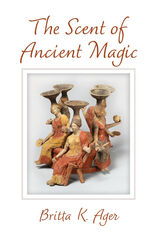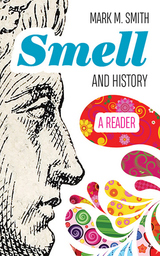
Table of Contents:
Introduction
Part One: The Perceptual Revolution or the Sense of Smell on Trial
1. Air and the Threat of the Putrid
2. The Extremes of Olfactory Vigilance
3. Social Emanations
4. Redefining the Intolerable
5. The New Calculus of Olfactory Pleasure
Part Two: Purifying Public Space
6. The Tactics of Deodorization
7. Odors and the Physiology of the Social Order
8. Policy and Pollution
Part Three: Smells, Symbols, and Social Representations
9. The Stench of the Poor
10. Domestic Atmospheres
11. The Perfumes of Intimacy
12. The Intoxicating Flask
13. "Laughter in a Bead of Sweat"
14. The Odors of Paris
Conclusion
Notes
Index
Reviews of this book:
[This book] is not only serious, but interesting and important; one of those studies that profoundly alters our understanding of both social life and history.
--Joan W. Scott, New York Times Book Review
Reviews of this book:
At once encyclopedic and impressionistic, The Foul and the Fragrant is...a masterful exposition of odors and the perception of odors from 1750 to the "Pasteurian revolution" of the late nineteenth century...It is an important and, at times, fascinating voyage...Exploring with imagination and audacity the changing role of smell in the anxieties and antagonisms of the modern world, Corbin reminds us that social history, too long sanitized and too often abstract, must make room for the senses.
--Michael Burns, Los Angeles Times Book Review
Reviews of this book:
The story has never been told more brilliantly, nor with such verve and perceptiveness. That alone would make Corbin's book worth reading, but one may read it as well for a deeper understanding of the roots of modern urban anxieties about the unwholesome...Corbin's book is a tour de force.
--Simon Schama, New Republic

In this comprehensive and engaging volume, medical historian Jonathan Reinarz offers a historiography of smell from ancient to modern times. Synthesizing existing scholarship in the field, he shows how people have relied on their olfactory sense to understand and engage with both their immediate environments and wider corporal and spiritual worlds.
This broad survey demonstrates how each community or commodity possesses, or has been thought to possess, its own peculiar scent. Through the meanings associated with smells, osmologies develop--what cultural anthropologists have termed the systems that utilize smells to classify people and objects in ways that define their relations to each other and their relative values within a particular culture. European Christians, for instance, relied on their noses to differentiate Christians from heathens, whites from people of color, women from men, virgins from harlots, artisans from aristocracy, and pollution from perfume.
This reliance on smell was not limited to the global North. Around the world, Reinarz shows, people used scents to signify individual and group identity in a morally constructed universe where the good smelled pleasant and their opposites reeked.
With chapters including "Heavenly Scents," "Fragrant Lucre," and "Odorous Others," Reinarz's timely survey is a useful and entertaining look at the history of one of our most important but least-understood senses.

The Scent of Ancient Magic explores the complex interconnection of scent and magic in the Greco-Roman world between 800 BCE and CE 600, drawing on ancient literature and the modern study of the senses to examine the sensory depth and richness of ancient magic. Author Britta K. Ager looks at how ancient magicians used scents as part of their spells, to put themselves in the right mindset for an encounter with a god or to attack their enemies through scent. Ager also examines the magicians who appear in ancient fiction, like Medea and Circe, and the more metaphorical ways in which their spells are confused with perfumes and herbs. This book brings together recent scholarship on ancient magic from classical studies and on scent from the interdisciplinary field of sensory studies in order to examine how practicing ancient magicians used scents for ritual purposes, how scent and magic were conceptually related in ancient literature and culture, and how the assumption that strong scents convey powerful effects of various sorts was also found in related areas like ancient medical practices and normative religious ritual.

Smell and History collects many of the most important recent essays on the history of scent, aromas, perfumes, and ways of smelling. With an introduction by Mark M. Smith—one of the leading social and cultural historians at work today and the preeminent champion in the United States of the emerging field of sensory history—the volume introduces to undergraduate and graduate students as well as to historians of all fields the richness, relevance, and insightfulness of the olfactory to historical study.
Ranging from antiquity to the present, these ten essays, most of them published since 2003, consider how olfaction and scent have shaped the history of medicine, gender, race-making, class formation, religion, urbanization, colonialism, capitalism, and industrialization; how habits and practices of smelling informed ideas about the Enlightenment, modernity, and memory; how smell shaped perceptions of progress and civilization; and how people throughout history have used smell as a way to organize categories and inform worldviews.
READERS
Browse our collection.
PUBLISHERS
See BiblioVault's publisher services.
STUDENT SERVICES
Files for college accessibility offices.
UChicago Accessibility Resources
home | accessibility | search | about | contact us
BiblioVault ® 2001 - 2024
The University of Chicago Press









